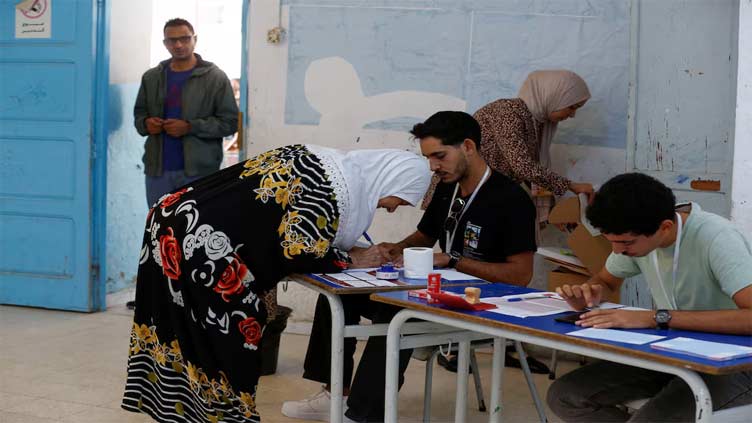Tunisians vote in election, with main rival to President Saied in prison

World
Just under 10 million Tunisians are eligible to vote
TUNIS (Reuters) - Tunisians voted on Sunday in an election in which President Kais Saied is seeking a second term, with his main rival suddenly jailed last month and most opponents imprisoned or barred from running.
Sunday's election pits Saied against two rivals: his former ally turned critic, Chaab Party leader Zouhair Maghzaoui, and Ayachi Zammel, who had been seen as posing a big threat to Saied until he was jailed last month.
Tunisia had for years been hailed as the only relative success story of the 2011 "Arab spring" uprisings for introducing a competitive, though flawed, democracy following decades of autocratic rule.
However, rights groups now say Saied, in power since 2019, has undone many of those democratic gains while removing institutional and legal checks on his power. Saied, 66, has rejected criticism of his actions, saying he is fighting a corrupt elite and traitors, and that he will not be a dictator.
Senior figures from the biggest parties, which largely oppose Saied, have been imprisoned on various charges over the past year and those parties have not publicly backed any of the three candidates on Sunday's ballot. Other opponents have been barred from running.
"The scene is shameful. Journalists and opponents in prison, including one presidential candidate. But I will vote for change," said Wael, a bank employee in Tunis, who gave only his first name.

The Election Commission said turnout by 1 pm was 14%. Just under 10 million Tunisians are eligible to vote.
Polls close at 6 p.m. (1700 GMT) and results are expected in the next two days.
Political tensions have risen since an electoral commission named by Saied disqualified three prominent candidates last month, amid protests by opposition and civil society groups.
Lawmakers loyal to Saied then approved a law last week stripping the administrative court of authority over election disputes. This Court is widely seen as the country's last independent judicial body, after Saied dissolved the Supreme Judicial Council and dismissed dozens of judges in 2022.
While elections in the years soon after the 2011 revolution were fiercely contested and drew very high participation rates, public anger at Tunisia's poor economic performance and corruption among the elite led to disillusionment.

Saied, elected in 2019, seized most powers in 2021 when he dissolved the elected parliament and rewrote the constitution, a move the opposition described as a coup.
A referendum on the constitution passed with turnout of only 30%, while a January 2023 runoff for the new, nearly powerless, parliament he created with that constitution had turnout of only 11%.
Nonetheless, he still commands support.
"Saied is the first president who fought corrupt politicians and influential businessmen, so we will elect him and renew our support for him," said Salem Lahmar, a fruit seller.
Although tourism revenues are on the rise and there has been financial help from European countries worried about migration, state finances remain strained. Shortages of subsidised goods are common, as are outages of power and water.


